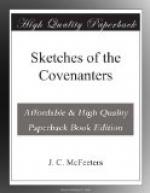[Illustration: Melville before king James.
Andrew Melville was able to stand before the king because he habitually stood before God. He was wise and strong to give advice and warning in the name of Christ to the sovereign of the nation, because he took his orders from Jesus Christ, the king of kings and lord of lords. He was banished for his faithfulness, and died in France, in 1622, being 77 years old.]
At another time Melville became so animated in his remonstrance against the despotic monarch, that he took hold of his arm, and gave him an admonition such as few kings have ever heard. His passionate eloquence flowed in a torrent: “I must tell you, Sir, there are two kings, and two kingdoms in Scotland. There is King James VI., head of the commonwealth; and there is Christ Jesus, the King of the Church, whose subject King James is, and of whose kingdom he is not a king, nor a lord, nor a head, but a member. Sir, when you were in your swaddling clothes, Christ Jesus reigned freely in this land, in spite of all his enemies.” The words penetrated the guilty soul like flashes from the eye of God. For the time the men had exchanged places; Melville was king.
Melville suffered for his faithfulness; he was banished. Yet he was rewarded with a green old age and a triumphant death. At the age of sixty-eight he wrote from the land of his exile, “I thank God, I eat, I drink, I sleep, as well as I did thirty years bygone, and better than when I was young. My heart is yet a Scotch heart, and as good, or better than ever, both toward God and man. The Lord only be praised for this, to whom belongs all glory.” He died in France in 1622.
The supremacy of Christ is the glory of the Church. Jesus is the Fountain-Head of life, love, law, government, and authority. Are we maintaining this exalted truth with the courage of our ancestors? The zeal of our fathers, if revived in these days, would electrify the world.
* * * * *
Points for the class.
1. What financial question in those days ensnared the Church?
2. How was her independence affected by state patronage?
3. What was the great question in controversy?
4. How did the state make use of Episcopacy in the battle with Presbyterianism?
5. How did Melville resist the king’s attempt to rule the Church?




